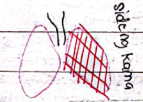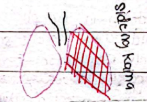[5.2] ONCO Part II (Breast Cancer, Lung Cancer, Hodgkin's Lymphoma, Multiple Myeloma, Prostate Cancer, Testicular Cancer, and Cervical Cancer)
1/209
Earn XP
Description and Tags
From Ma'am Jaidee Rojas' lecture last August 1 and 2, 2025
Name | Mastery | Learn | Test | Matching | Spaced |
|---|
No study sessions yet.
210 Terms
Breast cancer
Most common cancer worldwide
Terminal duct lobular units (site for milk release)
Where is breast cancer commonly located?
FALSE
It serves as a protective factor: The more the terminal duct lobular unit is used, the more it matures (cancer cells latches to immature cells)
TRUE or FALSE: Breastfeeding is a risk factor of breast cancer
Gender
Age
Fam history of Cancer
Race
What are the non-modifiable risk factors of breast cancer?
Females: 99%
Males: 1%
BRCA 2 Gene
Klinefelter syndrome: XXY (Gynecomastia)
NM Risk factor of Breast Cancer: Risk percentage of females and males. What genes serve as risk factors for males?
55-60 yo (though pabata na nang pabata ngayon)
NM Risk factor of Breast Cancer: Age that are more at risk
Caucasian
NM Risk factor of Breast Cancer: What race is more at risk?
Smoking
Alcohol drinking
Obesity
What are the modifiable risk factors of breast cancer?
For obese females, there is an increase in subcutaneous fats → estrogen conversion
Explain the reason why obesity is a modifiable risk factor of breast cancer.
Progesterone
What is the opposite or counterpart of estrogen?
Nulliparity
Early Menarche (<12 yo)
Late Menopause (>55 yo)
Pills
What are the estrogen related modifiable risk factors of breast cancer?
Mammography
Tumor Marker Test
Genetic Testing
Imaging Test
What are the diagnostic tests for breast cancer?
Mammography
Diagnostic Test: X-ray of the breast
TRUE
TRUE or FALSE: One should avoid powders, deodorants, and perfumes on the day of the mammography
40 yo
What is the earliest age for mammography?
40-44 yo
Mammography (Age group): Option to start screening
45-54 yo
Mammography (Age group): Required annually
55 yo above
Mammography (Age group): Biennially; every 2 years; every other year
30 yo
Mammography (Age group): If the patient is high risk for breast cancer, what age are they required to be screened annually?
FALSE
Smaller chested
TRUE or FALSE: Mammography is more painful for larger chested women
Yes
Yes
Yes
Yes (Pills)
Yes (Gynecomastia)
No (No more breast tissue)
Identify if the following groups of people are allowed to have mammography:
Smaller chested women
With implant
Lesbians
Transwomen
Males
Post mastectomy
CA-125
What is the tumor marker for breast cancer?
Breast Cancer
Ovarian Cancer
What types of cancer share tumor marker CA-125?
BRCA 1 Gene
BRCA 2 Gene
Her 2 Gene
Her 2 Proteins
What genes are detected for breast cancer?
Breast Cancer
Ovarian Cancer
Prostate Cancer
What types of cancer share BRCA 2 Gene?
CT Scan
Imaging Test (Breast Cancer): Radiowaves
1st; faster results
Least expensive
MRI
Imaging Test (Breast Cancer): Magnetic Waves
2nd; Better detailed structures
Remove metallic objects
Remove
Retained if they are MRI capable (most of pacemakers nowadays)
Remove of not allowed to undergo MRI if not MRI capable
Sedate patient
Retained since it is not highly magnetic
If will undergo brain MRI, huwag na ituloy since malabo rin ang images
What should be the nursing intervention before MRI? What should you do if the patient has the following?
Jewelries, implants, hearing aids, prostheses
Pacemaker
Claustrophobia
Braces
PET scan
Imaging Test (Breast Cancer): Radioisotopes (special)
PET Scan
Imaging Test (Breast Cancer): Will identify both structural functional abnormalities and metabolic abnormalities
FALSE
Kikinang ang parts na may high cell metabolism
TRUE or FALSE: In PET scan, kikinang siya kapag may water
PET Scan
Imaging Test (Breast Cancer): Most expensive, more side effects, and slower results
Ultrasound
Imaging Test (Breast Cancer): Sound waves
Drink 6-8 glasses of water without voiding
Full bladder, para maganda ang bounce ng radiowaves
What should the nursing intervention be if the patient will undergo pelvic and abdominal ultrasound?
FALSE
Upper outer quadrant
TRUE or FALSE: Breast cancer usually occurs at the left lower quadrant of the breast
FALSE
Non-tender, firm, fixed, with irregular borders
TRUE or FALSE: Breast cancer presents as tender, firm, movable lumps, with regular borders
Peau D’orange
Breast Cancer: What is the other term for orange peel skin?
FALSE
Near the areola
TRUE or FALSE: Peau D’orange presents as large pores distant from the areola
TRUE
TRUE of FALSE: Abnormal nipple discharge, inversion, retraction, and ulceration are included in the s/sx of breast cancer
Mastectomy
Radiation therapy
Chemotherapy
Progesterone therapy
What are the management for breast cancer?
Modified Radical
Radical
Total
Lumpectomy
Breast Cancer: What are the types of Mastectomy?
Modified Radical
Type of Mastectomy:
Removal of breast tissues + nipple areola complex + Axillary lymph nodes
Pectoralis major + minor muscles intact
Radical
Type of Mastectomy: Remove everything
Total
Type of Mastectomy:
Prophylactic and benign
Removal of breast tissues + Nipple Areola complex
Lumpectomy
Type of Mastectomy:
Everything is intact; tumor only removed
Cosmetic effects
Lymphedema
Hematoma Formation
Infection
What are the post-op complications of mastectomy?
All about prevention; Semi-fowler’s with affected arm elevated above the level of the heart
Avoid BP taking on the affected arm
Avoid venipuncture on the affected arm
Mastectomy: What are the interventions for lymphedema as a post-op complication?
Jackson-Pratt Drainage (Negative pressure suction) → Please press
Mastectomy: What is/are the intervention/s for hematoma formation as a post-op complication?
Antibiotics (7-14 days) [Culture studies first]
Mastectomy: What is/are the intervention/s for infection as a post-op complication?
5-7 days after the menstrual period
Same day each month
Same day each month
Breast self-examination: Identify what to teach the patient about BSE scheduling?
Pre-menopausal
Post-menopausal
Irregular
Inspection
Stand in front of the mirror
Place both arms on the side → head → pelvis
BSE: What should you do first? What should your position be?
Palpate
Outer to inner palpation from the axilla (circular motion)
Press the nipple
Lie down
BSE: What should you do second? What should your actions be?
Place folded towel underneath the shoulders
BSE: To spread breast tissues evenly across the chest wall when lying down, what should you do?
Circular motion
Up down
Radial
BSE: What motion is the best? What are the other methods?
Ronchogenic Carcinoma
What is the other term for lung cancer?
Age
Gender
Fam Hx
Cigarettes Smoking
Inhalational chemical carcinogens
Occupational pollutants
What are the risk factors of lung cancer?
60 yo above
Lung cancer: What age group is the most at risk?
Males
Lung cancer: Who are more at risk, males or females?
80%
Lung cancer: How many percent of lung cancer death cases are caused by cigarette smoking?
TRUE
TRUE or FALSE: Secondhand smoking is a proven risk factor for lung cancer
FALSE
Not enough evidence
However, the first case of vape-related death was recorded. A 22-year-old male had a cardiac arrest due to the presence of 2 large blood vessels obstructing the heart. The only risk factor found is his vaping for 2 years straight.
TRUE or FALSE: Vape is a proven risk factor for lung cancer
FALSE
Not enough evidence due to the limited sample size
TRUE or FALSE: Marijuana is a proven risk factor for lung cancer
FALSE
Safe; however, note the ingredients since some have petroleum, which do not dissolve in the lungs, increasing the risk for pneumonia
TRUE or FALSE: Inhalers are proven to be a risk factor for lung cancer
Inhalational chemical carcinogens
Occupational pollutants
Which type of risk factor for lung cancer do the following belong to:
Rugby, gasoline, paint
Silica dust, asbestos, radon gas
Tumor marker test
Imaging test
Bronchoscopic Biopsy
What are the diagnostic tests for lung cancer?
CEA
Carcinoembryonic Antigen
What is the tumor marker for lung cancer?
Lung Cancer
Colon Cancer
What types of cancer share the tumor marker CEA?
Low dose CT Scan
What is the initial screening and imaging test for lung cancer?
50-80 years old
Annually
Smokers (current or previous, 20 smoking pack year Hx)
Lung Cancer: At what age group is low dose CT scan indicated for the screening of lung cancer?
Follow up:
How often?
Who are required?
1 pack year = 1 pack (20 cigs)/day for a year
Lung Cancer: How is pack years calculated, or what is it’s equivalent?
Both A and B
Lung Cancer: What is the equivalent of 20 smoking pack year history?
a. 1 pack/day 20 years
b. 2 packs/day 10 years
Bronchoscopic Biopsy (Bronchoscopy + Biopsy)
What is the confirmatory test for lung cancer? (Please give the specific procedure)
Pre-endoscopy
Suppress gag reflex
Throat lidocaine spray, as ordered
Post-endoscopy
Assess for the return of gag reflex (bago supine or pakainin)
Lung Cancer: What are the nursing interventions for the following, in relation to bronchoscopic biopsy?
Pre-endoscopy
Post-endoscopy
Nagging cough (dry, persistent cough; may lead to hemoptysis but this is a late sign)
→ Dyspnea (d/t decreased O2 capacity)
→ Fatigue
→ Anorexia (leading to inability to do ADLs)
→ Cachexia, N/V, Dysphagia, Hoarseness of the voice
→ Chest pain (late stage)
Lung cancer: Explain the signs and symptoms
Thoracotomy (Surgery)
Radiation therapy
Chemotherapy
Lung Cancer: What are the methods of management for lung cancer?
Thoracotomy
Lung Cancer: Surgical incision into the thoracic cavity
Lobectomy
Pneumonectomy
Wedge Resection
Lung Cancer: What are the types of thoracotomy?
Lobectomy
Lung Cancer (Thoracotomy): Remaining lobes will re-expand

Pneumonectomy
Lung Cancer (Thoracotomy): Removal of the entire lung


Unaffected (to promote max. lung expansion)
LUPA: Lobectomy → Unaffected; Pneumonectomy → Affected
Lung Cancer (Thoracotomy): What side should the patient who has undergone lobectomy lie on?

Affected side (to promote maximum lung expansion)
LUPA: Lobectomy → Unaffected; Pneumonectomy → Affected
Lung Cancer (Thoracotomy): What side should the patient who has undergone pneumonectomy lie on?
Wedge Resection
Lung Cancer (Thoracotomy): Same concept as segmental resection; Biopsy
Incentive spirometry
The purposes of this are the following:
To prevent atelectasis
To strengthen intercostal muscles
10-15 times / Waking hours
How often should incentive spirometry be done?
a. Inhale (INhale = INcentive)
c. Suck
SATA: Incentive Spirometry
a. Inhale
b. Exhale
c. Suck
d. Blow
Tumor
What does “-oma” mean?
Carcinoma
Cancer types: Epithelial tissues (linings, organs, glands)
Carcinoma
Cancer types: 80-90% cases
Sarcoma
Cancer types: Connective Tissues
Osteosarcoma
Cancer types (Sarcoma): Bones
Chondrosarcoma
Cancer types (Sarcoma): Cartilage
Leiomyosarcoma
Cancer types (Sarcoma): Smooth muscles
Sarcoma
Cancer types: Relatively rare; Malignant
Leukemia
Cancer types: Blood
Lymphoma
Cancer types: Lymph tissues, nodes
Myeloma
Cancer types: Plasma cells
Myeloma
Cancer types: WBC; Matured B Cells
Produce antibodies/immunoglobulins
What is the function of Matured B Cells?
Hodgkin’s Lymphoma
What is the type of cancer being described?
Rare (12,000 Filipinos)
High cure rate; very good prognosis (kahit stage 4, nagrerecover)